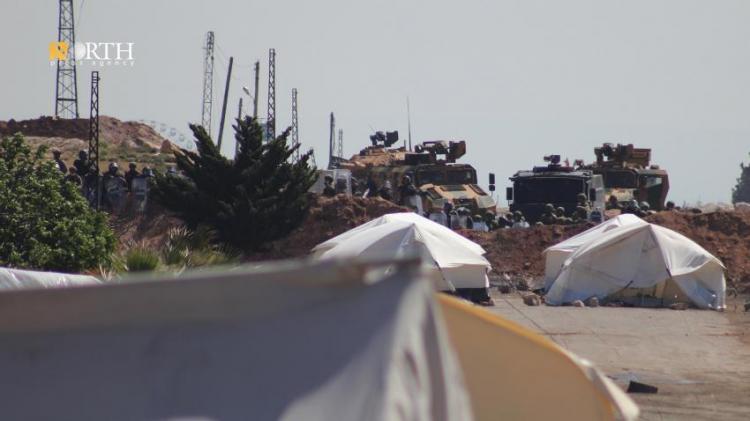No military operations in Idlib, political solution is closest – Syrian opposition
Idlib – North-Press Agency
Syrian opposition figures excluded the probability of launching any new military operations in northwestern Syria in the current stage, giving more importance to a political solution for the ongoing crisis which has plagued the country for the last ten years
.
In his talk with North-Press, Syrian opposition figure Michel Kilo said: "Nobody knows the content of the negotiations launched between Turkey and Russia, and now the Americans a month and a half ago, but it is clear that there will not be any violations of the ceasefire in northwest Syria."
He excluded the possibility of military operations in the de-escalation zone in the current stage, expecting that if it happens, it will be "temporary", and will be as a result of the Russia's dissatisfaction with the Turkish attitude towards Hayat Tahrir al-Sham (HTS) and its presence in the region.
He said that HTS has recently tried to open a crossing with Syrian government-controlled areas in exchange for the opening of the M4 highway, describing “an overt betrayal by the HTS and their lending a hand to the Syrian regime."
Kilo added that if the Syrian government tries to violate the agreement under Iranian pressure, a real dilemma will be created in light of a significant Turkish military mobilization in the area.
He noted that Turkey's return to the Sochi borders is no longer on the table, because the political solution is on the table for the time being.
Michel Kilo believes that there is no intent to carry out a military operation except in one impossible case – "the collapse of negotiations, which means launching a large military operation, something that Russia cannot bear the consequences of."
"The negotiations have gone beyond the Idlib issue and are now searching for political solutions, which means getting through the stage of military operations and the changes on the ground,” he said.
In his latest opinion, Kilo relies on Russian statements in saying that "they are unable to send the regime back to all Syrian areas,” in addition to a US statement considering any movement in the Idlib region as "a strategic change which means we do not allow anyone to approach the region."
On Monday, the Turkish President Recep Tayyip Erdogan threatened the Syrian government "in case of its non-compliance with the agreements it signed with its supporters, and the violation of the ceasefire agreement in Idlib governorate in northwestern Syria."
On March 5, the Russian President Vladimir Putin and his Turkish counterpart Erdogan announced a ceasefire agreement in Idlib, agreeing on the establishment a secure corridor of a 6 km depth on either side of the M4 highway.
Groups' leaders do not trust Turkey
Muhammad Abu Mustafa, a field leader in al-Jabha al-Wataniya lil-Tahrir (National Front for Liberation, a Syrian rebel coalition that is part of the Turkish-backed Free Syrian Army/TFSA fighting in the Syrian Civil War), said that Turkish officers assured them that there will not be any military action in the region for the time being.
He added that Turkey will not try to start a military operation against the Syrian government as long as the latter does not violate the truce, but if it tries, "our response will be strong."
"The besieged Turkish points remain unaccounted for, but there is news that refers to changes soon." Abu Mustafa said.
Since the announcement of the ceasefire, Turkey has mobilized thousands of military vehicles, in addition to thousands of soldiers and advanced military hardware, including anti-aircraft equipment and tanks.
Abu Mustafa believes that Turkey moves in Idlib region "comfortably and without fear”, which means that they are confident that there will nothing in the coming days.
He confirmed that armed groups in Idlib are fully absent from the reality of the Russian-Turkish agreement and from the existence of the Turkish forces on the ground. Therefore, the fate of the southern Idlib countryside and al-Ghab Plain in the Hama countryside is still unknown to them.
He noted that this absenteeism "makes the leaders of the groups distrust both the Syrian government and Turkey, and they are always ready for any emergency."
On April 22, the Ministers of Foreign Affairs of Russia, Iran and Turkey held a virtual meeting in the form of the Astana agreement, where they confirmed on the necessity of the continuation of high-level contacts to hold a sixth summit within the framework of the Astana process after normalizing the coronavirus situation.

